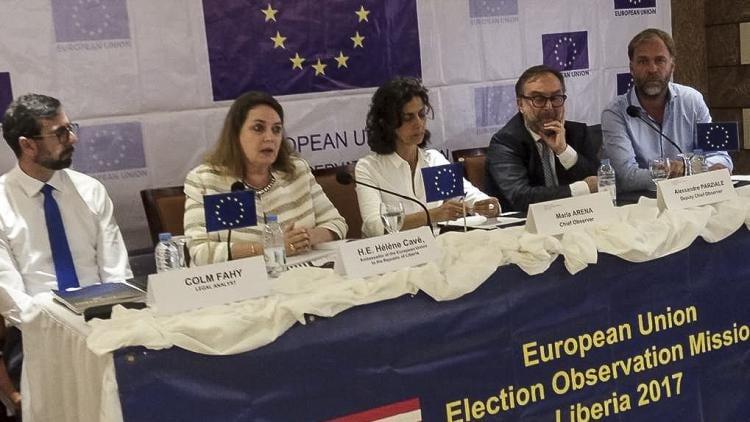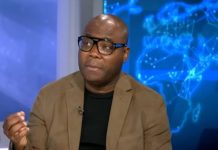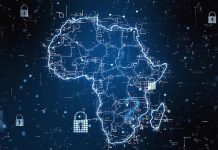Africa-Press – Liberia. CDC Presumptive Standard Bearer, incumbent president George Manneh Weah, could rig 2023 General and Presidential Elections if appropriate safeguards through electoral reform are not put in place. The likelihood seems high as anti-democratic precedents are fast sufficing in his remaining months.
We have been calling for electoral reform since 2018 and this pressing national concern cannot be overlooked. Thankfully, the European Union (EU) reinforced our call by echoing 23 previous recommendations it made after a flawed 2017 election. I have done a summary for national review.
Twenty-three (23) Recommendations from EU Election Observation Mission (EUEOM):
Initiate a constitutional referendum to remove the ethnic definition of Liberian citizenship and use civic education to campaign against racial discrimination.
Review election laws and civil procedure laws to consolidate all relevant timelines and any procedural extensions.
Establish lower courts of appeals in order to alleviate an overburdened Supreme Court, which could equally contribute to the handling of cases including election complaints in an expeditious manner.
Amend 2014 Code of Conduct Law to promote participation and right to stand.
Review criteria pertinent to establishing and registering political parties in order to promote more cohesion and policy in party organizations.
Review of regulatory requirements relating to political parties’ nomination of candidates and assessing procedures related thereto.
Review provisions on electoral offenses to address and remove any ambiguities and incoherencies.
NEC to review and amend all appeals timelines in order to ensure consistency and fairness throughout.
Comprehensive practical training for both lawyers and Hearing Officers to be implemented well in advance of the 2023 elections.
Review of article 83 and its implications relative to the timeline for handling complaints against presidential election results taking a cue from SC’s ruling of 6 November 2017.
A relook at NEC regulations and guidelines relative to the timely publication of NEC BoC decisions.
Delimitation of electoral constituency boundaries should be done in accordance with Liberia’s Constitution and international obligations.
Consideration of support towards the existing project of creation of a Civil Registry and using it as a basis for registering voters potentially transitioning towards passive voter registration arrangement.
Formulation of harmonized regulatory requirements in one single legal instrument.
Support and strengthen political parties and their poll watchers’ commitment to ensuring electoral integrity.
Establish an appropriately resourced department on the campaign and political party finance within NEC in order to enhance institutional capacity.
Increase NEC’s capacity to scrutinize submitted reports.
Implement effective measures to ensure the opportunity for voters to vote for all qualified citizens.
Consider modification of legislation (NEL 4, §4.5 and/or enacting of Affirmative Action Bill) and NEC regulations to achieve enforceable affirmative action for women participation and ensure greater representation in decision-making roles within election administration.
Further improve access and opportunity for Persons with Disabilities (PwDs) to vote through measures for better accessibility of PPs, provision of Tactile Ballot Sleeves, and mainstreaming of information on its use in Civic and Voter Education.
Consideration should be given to introduce a legal provision for free airtime to political parties and candidates on state-owned broadcasters in order to allow all eligible contenders to effectively communicate their platforms and to ensure equal treatment of political parties and candidates.
The preservation of a free media environment is essential to ensuring that Liberia’s efforts to safeguard peace and stability and protect fundamental human rights are achieved with success.
Consider the extension of domestic observation to the whole electoral cycle and reinforce the role and participation of civil society organizations in the monitoring and reform of the electoral process.
We overwhelming welcome the EU’s call for GOL to implement these basic democratic reforms which are not only doable before the 2023 elections but critical to peace and stability in Liberia. We call on opposition political parties to focus more on electoral reform ahead of 2023. This would certainly save our democracy from potential collapse.
The EU spent a total of $62.2 million USD to help fund our 2017 elections and provide appropriate budget support.
The breakdown:
1) 2017 – Euros 10 million ($11.2 million USD)
2) 2016 – Euros 16 million ($18 million USD)
3) 2015 – Euros 29.2 million ($33 million USD)
If EU’s recommendations cannot be considered, we call on them to withhold all financial support toward elections in Liberia until these reasonable reforms are carried out or implemented.
Are democratic stakeholders and policymakers listening? Those who have faith in a democracy must now begin to pursue this path in Liberia’s best interest.
About The Author: Martin K. N. Kollie is an activist who currently lives in exile. He’s a proponent of good governance, democracy, equality, and human rights.






